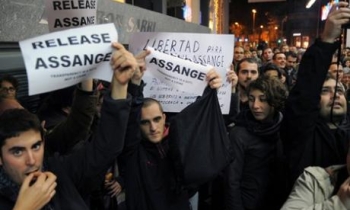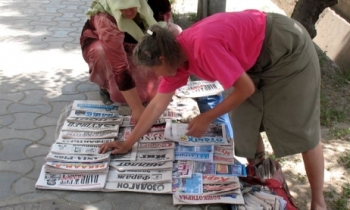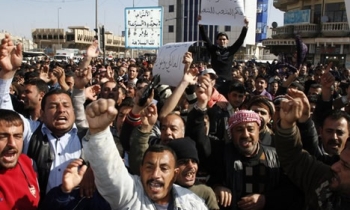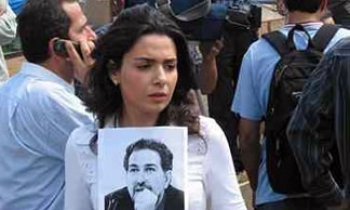(AXcess News) Washington - The documentary "Control Room," director Jehane Noujaim's film showcasing Al-Jazeera's role in the Iraq war, still ignites debate two years after its release.
A panel of veteran journalists and a filmmaker convened Tuesday at the Arlington County, Va., Central Library, where participants watched and discussed the 90-minute documentary as part of the library's Cross Cultural Cinema program.
The four-person panel included Al-Jazeera's Washington and New York bureau chief Abderrahim Foukara and senior media adviser Carl Rochelle of the McGinn Group, a communications consulting firm, and a former NBC and CNN reporter.
Since its launch in 1996, Al-Jazeera has been banned in several Muslim countries for criticizing their regimes and, conversely, President Bush has dubbed it "the mouthpiece of Osama."
But Al-Jazeera, along with some of its Arab counterparts, attracts some of its harshest criticism for its frequently graphic content.
"We never have shown dead bodies in the U.S.," Rochelle said. "We find it distasteful. But one Arab station even showed a man cutting the head off of a poor American live on television - he sawed it right off. And then Al-Jazeera pretty much ignored covering this kind of barbarity shown by the people in Iraq, but they were happy to show what the Americans can do."
Al-Jazeera has never shown a beheading, although rumors persist that it has, Foukara said.
"There is, however, an issue of sensibility," he said. "Al-Jazeera is the product of turmoil. It is a very turbulent region - very diversified - but increasingly turbulent. You see that reflected in Al-Jazeera."
The graphic nature of Arab television dates to the Israeli-Palestinian conflict, Foukara said.
"Arabs were exposed to such gore that their tolerance threshold for it grew by leaps and bounds," he said. "What the war in Iraq did was open debate in the U.S. over what should or shouldn't be shown. If you decide to go to war, you should be prepared to tell the people about the ugliness of that war."
Although he does not credit Al-Jazeera with affecting the ultimate outcome of the Iraqi war, Foukara said the channel did change the war's course in several instances.
He cited its coverage of the U.S. soldier who mounted a ladder to drape the American flag over the head of Saddam Hussein's statue and said it made an indelible impression on the Arab community.
"The Bush administration had said they were there to free the Iraqis," Foukara said, "but that one scene told people in the region a different message - the people thought, ‘These guys have come to colonize Iraq.'"
The station does, however, have its share of ideologists who favor Islamic law.
"Anybody is telling you a fib if they say there are no Islamists at Al-Jazeera," he said, "but there are almost 21 different countries represented at Al-Jazeera. The station takes it upon itself to reflect that dynamic."
The documentary also prompted questions about the accuracy of Western journalism's role in Iraq, specifically that of reporters embedded with U.S. military units.
As a reporter who spent three months in Iraq, however, Rochelle said the circumstances of his surroundings made it hard for him to do his job.
"I can tell you that I can go anywhere in the country of America and talk to people," he said, "but if an American journalist tried to go anywhere in Iraq and do the same thing, he would last, what, less than a day? A couple of hours? He'd be kidnapped, he'd be killed. I never went out anywhere without an armed escort and body armor."
An English-language version of "Al-Jazeera International" was scheduled to launch in June, but has been delayed until November.
Foukara said that, like its predecessors, the new service aims to revolutionize the news once again.
The Arlington Central Library hosted the panel as part of its Arlington Community Resilience Project, which was established after the Sept. 11 attacks.
The program was federally funded until January 2004, after which the Friends of Arlington Public Library and George Mason University pitched in to ensure the screenings would continue.
Presented as a way to rectify the inaccuracies of Sept. 11 news coverage, the screenings seek to promote cross cultural education, said the panel's moderator, Lina Beydoun, the faculty director for the Center for Global Education at George Mason University.
"Arlington is obviously a very educated community," Beydoun said, "but we aim to transmit more insightful, academic information to that community."









